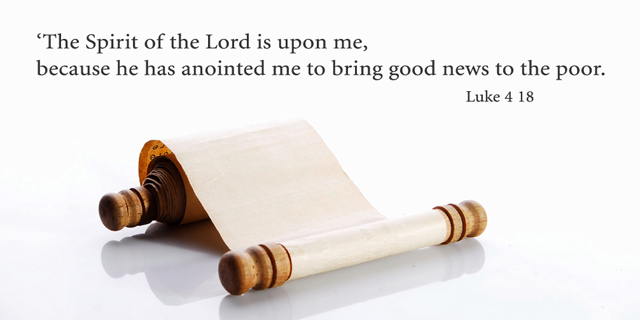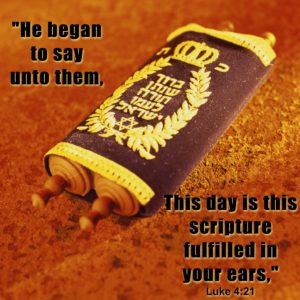 Luke 4:18
Luke 4:18
Jesus is known by many names: Emmanuel, Advocate, King of Kings, Rock of Ages, Teacher, Messiah, Good Shepherd, Bright and Morning Star, Bridegroom, Great Physician, the Holy One, the Man of Sorrows, the Living Bread, Son of David, the Carpenter’s Son, the Living Stone, the Rose of Sharon.
There are at least 208 names for Jesus. I personally think we could add many more to this list, based on what Jesus means to each of us. I would like to add one in particular “Reformer.”
This fall we celebrate with the Evangelical Lutheran Church of America, the 500th anniversary of the Protestant Reformation. Roman Catholic priest and professor Martin Luther began that reformation by nailing his critical 95 theses to the door of the Wittenberg Church on October 31, 1517. The impact that followed turned the world virtually upside down.
In Luke 4:16-30 Jesus preaches in his hometown synagogue, undaunted by the pressure of preaching to people who know him well. He reads the prophet Isaiah’s words and then proclaims that the “good news” prophecy he has just read—one of release, recovery and yes, dramatic reform—was being fulfilled on that very day.
Revealing truth through God’s Word
 Jesus knew the words, the laws of God for God’s people. He said in his Sermon on the Mount that he came not to change the words but to explain their full meaning. For example, he taught that hating one’s brother is the same as murder. Lustful thoughts were the same as adultery. In his view, the true intent of the law centered on the intentions of the heart.
Jesus knew the words, the laws of God for God’s people. He said in his Sermon on the Mount that he came not to change the words but to explain their full meaning. For example, he taught that hating one’s brother is the same as murder. Lustful thoughts were the same as adultery. In his view, the true intent of the law centered on the intentions of the heart.
Through Isaiah, he called for living out God’s Word by seeking social justice for all, including those who lived on the margins of Jewish society but also people of other countries, cultures and faith experiences.
Martin Luther found his breakthrough in his spiritual struggles from devout study of the Word. His Roman Catholic training emphasized works of the Law and performing acts of penance to repent for misdeeds. He would even crawl up the steps of a cathedral or sleep naked on a floor to show he was sorry for his sins.
This was all a dead end for Luther spiritually. But as he studied the Scriptures more intently his revelation came from Romans 3:28. “Therefore, we conclude that a man is justified by faith apart from works of the Law.”
This insight delivered his moment of freedom and salvation, which set in motion events that led to the Reformation and the birth of the Protestant Church. He began to proclaim that faith alone saves a person and not good works or even acts of penance.
“I grasped that the righteousness of God is the righteousness by which, through grace and sheer mercy, God justifies us through faith,” Luther wrote, foreshadowing the same revelation that would come upon John Wesley in 1738. “Thereupon,” he continued, “I felt myself to be reborn and to have gone through open doors into paradise.”
We too need to know the Bible, study it intently and seek its truth for our daily lives. Do you study the Word? Are you in Bible study? Are you studying it at home every day? How can you grow in faith without it? The greatest personal breakthroughs come through this holy book.
Going into hard places
 Jesus did not stay in one place. The Gospels are a travel log of his many visits to places near and far. In Luke 4:16-30 he is in his hometown synagogue. You might consider that an easy place for him to preach. But as he said, “A prophet is not without honor except in his hometown.”
Jesus did not stay in one place. The Gospels are a travel log of his many visits to places near and far. In Luke 4:16-30 he is in his hometown synagogue. You might consider that an easy place for him to preach. But as he said, “A prophet is not without honor except in his hometown.”
This was not an easy gig at all. The congregation knew him from way back. That can breed a kind of disrespect like no other. And he knew them and all their stuff, another difficult dynamic.
Jesus went to other difficult places, too: to Samaria, where Jews like him were not welcome, and to the tombs where he encountered a ranting, demon-possessed madman. Then he set his face toward Jerusalem, where he knew he would be arrested, tried and executed.
Martin Luther went where it was hard to go as well. He was tried at the Diet of Worms and could have been killed. He agreed to be locked in a prison tower alone for his protection. But he used that time in solitary confinement to translate the Bible into the language of the people.
God often calls us into places and among people we would rather avoid. It may well be God’s will for you to face hardships in places and situations where burdens can be forged into blessings. God can lead us into the “valley of the shadow of death” if it is God’s will. But we know that God is always with us in that valley and that Jesus has gone there ahead of us.
At the end of the day, we who are in Christ have volunteered willingly to live in God’s service, whatever that may bring. As Paul said in Philippians, “For me, to live is Jesus Christ and to die is gain.”
Being good news for the poor
Jesus loves everyone; but he has a bias in favor of the poor. He proclaims recovery of sight to the blind (and access for the disabled), release to the captives (and unjustly imprisoned), deliverance for those who are oppressed (by racism and all other “isms” of society, even oppressed by abuse, violence or addiction).
Jesus brought healing and inclusion and raised the social status of women, children, tax collectors and outcasts. All of that was good news to desperate people living and dying in the dim shadows of society.
Martin Luther was good news for the poor as well. He challenged the church to reach out to people in helpful ways and to not take advantage of them in order to build large cathedrals or to enrich clergy living in luxury.
Where, when and how do we strive to be good news to the poor? Do you give of your means to help those on the margins of life? Do you take less for yourself so others can have more?
To bring liberation, healing and compassion, to proclaim good news to the poor, and may ultimately translate into bad news for the rich and powerful. Jesus angered his former teachers with his audacious good news that God favored all people, not just God’s chosen people. They wanted to throw him off a cliff.
Martin Luther was also a man of justice who spoke out against the evils of his time and in favor of wider, more informed public devotion to learning and living out God’s Word. He once said, “If you want to change the world, pick up your pen and write.” He also said, “An unjust law is no law at all” and “The gospel cannot be truly preached without offense and tumult.”
And yet, still today, injustice abounds. We are followers of Jesus if we speak out for those who are voiceless or lack influence and if we are activists for justice. Where can you say a word, write a word or do a word of justice from near or far? Where is your voice on immigration justice and mercy? Or health care for all? Or prison reform, or reducing gun proliferation and violence?
If we are true followers of Jesus Christ we should relate to and care about all people. We should study and share God’s Word. And we should speak Christ’s good news to the poor while speaking Christ’s redemptive truth to the powerful.
Indeed, Reformation—then and now—is dangerous work. But it is God’s work, work that must live in us. And best of all, God is with us.
